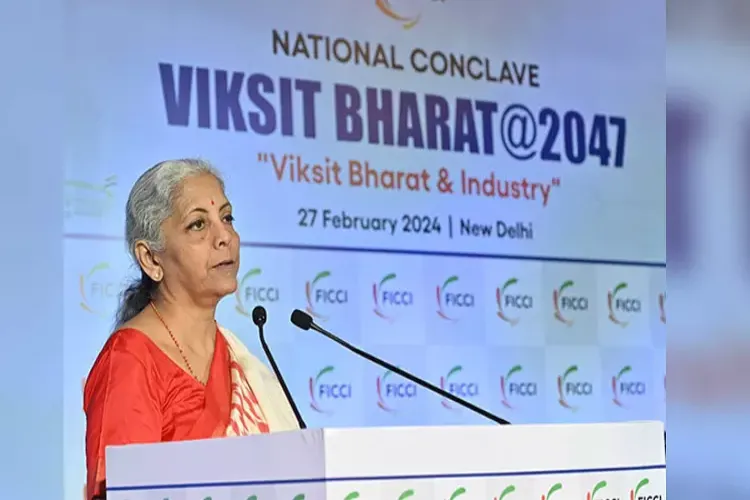
Minister of Finance Nirmala Sitharaman on Tuesday outlined the government’s strategic approach to the goal of Viksit Bharat through further reforms in the areas of electric mobility, space, artificial intelligence, AI, warehousing, logistics, tourism, green hydrogen, agriculture value addition and agriculture efficiencies. Seeking industry collaboration in this endeavour, she said the role of Indian industry is critical in achieving the goal of Viksit Bharat by 2047 even as the government remains committed in its policy to tap the immense potential in logistics, agriculture productivity or tourism.
“We should reach the destination of a developed India, i.e. Viksit Bharat by 2047. You (Industry) were with India during the freedom struggle, you built industry and capacity despite the colonial pressure. It is time for us to have an economic independence with the goal of ‘Viksit Bharat’, she emphasised, addressing an industry conclave on Viksit Bharat@2047’. She also assured industry that having become the 5th largest economy of the world on a strong foundation of reforms undertaken by the Government in the last few years, Prime Minister Narendra Modi is confident that in the third term we will be the third largest economy. “It’s because of the push which he likes to give in these areas, not just fiscal, but legislative and other measures as well,” Sitharaman said.
Underlining digital infrastructure as the fourth factor of production, beyond the traditional land, labour, capital and enterprise, Sitharaman said no country can move at the desired pace of achieving developmental goals for its own citizens effectively without digital infrastructure. “That’s why I would put digital Infrastructure as an important factor, without which we will not be able to scale up and bridge the gap with those who are still aspiring to move forward,” Sitharaman said. “India has demonstrated how — making investment in creating digital infrastructure at the bottom and scaling it up — led to creation of ‘India Stack’,” she added.
The Finance Minister pointed out that during the G20, countries appreciated what India has done in terms of spreading the digital public infrastructure (DPI) and want to replicate such an experience, for their own countries. “This is because they see the virtue of having digital infrastructure, which helps them to speed up, ramp up and scale up developmental goals,” Sitharaman noted. While Government is showing its commitment by ramping up capital expenditure, Sitharaman called for industry to expand, look for greater joint ventures around the world and move forward with great speed. “We are at the juncture in India’s history where it is just all opportunities, and it is for us to grab it,” added Sitharaman.
The Finance Minister also highlighted certain sectors in which the Government is focussing a lot like space, AI etc and where the government will push new innovations, investments and policy reforms.
She assured that with Government having emphasised that India should become a global hub for AI, centres of excellence will be set up for the same. “I think a great leap forward has been made in logistics with PM Gati Shakti and apart from agricultural warehousing where the Government is offering support on policy, legislative and investment front as well as bringing people together for the larger warehousing sector,” Sitharaman said. “India’s logistics potential is just not even touched; we have immense scope in this,” she added.
Anurag Thakur, Minister of Information & Broadcasting also reminded the audience that India has moved from being part of the ‘Fragile Five’ economies to becoming the fifth-largest economy in the world. Expressing his gratitude to tax payers, Thakur pointed out that previously when only a fraction of the allocated money was reaching the intended beneficiaries, today the Government has ensured that all of the money released reaches the recipient directly in their bank accounts.
Citing UPI as an example of the resolve of the Government to deliver on its promises, he noted that 46 per cent of all digital payments in the world are made in India and the world is looking up to India for technological prowess. The Minister encouraged industry leaders to forge partnerships with those seeking to invest in India and exploit India’s talents and capabilities that will contribute majorly to India’s transformation into a Viksit Bharat. Anish Shah, President, FICCI agreed that while the focus on capital expenditure that the government has put in, has helped the economy to get to a very strong footing, it is up to the private sector now to take it much further.